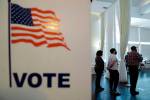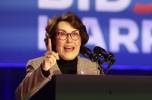Sandoval takes hits left, right
When Brian Sandoval decided last year to resign his lifetime federal judgeship and run for Nevada governor, he sought some encouragement in a telephone call to his dad, Ron.
"I guess you know what you're doing," his father taciturnly replied.
Taken aback, the son pressed on: "I'm running for governor, not joining the circus."
Ron Sandoval, a former deputy sergeant-at-arms in the Legislature with an inside view of state politics, came right back: "I think you are joining the circus."
Brian Sandoval's recollection of his dad's reaction drew a good laugh recently at a Republican women's group in Las Vegas.
Positive reinforcement, certainly. Still, as he leads and maneuvers among a small herd of Republican candidates, Sandoval is no shoo-in for a November center-ring appointment with Democratic heir-apparent Rory Reid.
Yes, the former attorney general and Assembly member leads by double-digits in polls heading into the June 8 Republican primary. Sandoval also is telegenic and has fundraising prowess and a résumé that includes service in every government branch.
And sure, his primary opponents are an embattled incumbent with pathetic approval ratings, Gov. Jim Gibbons, and a former North Las Vegas mayor, Mike Montandon, who trails badly in this elephant parade.
The circus Sandoval has chosen to perform in, however, is not one of floppy shoed clowns, glow sticks and cotton candy. Rather it is a high-wire act without a net, trying to balance above a cage of famished tigers of all stripes. It's the sword-swallower who can afford neither shaky hand nor persistent cough.
So much has changed in the five years since he left elected politics for an appointment to the U.S. District Court bench in Reno.
Democrats are now Nevada's majority electorate, and the GOP bloc has grown more conservative and distrustful of Republicans such as Sandoval with reputations as moderates.
Already fired on by some in his own party accusing him of flip-flopping on tax issues and gay marriage, Sandoval is targeted by Democrats fanning the flames of conservative distrust, spending hundreds of thousands of dollars on TV ads aimed at undermining Sandoval's conservative street cred.
Their goal? Soften up the GOP front-runner in hopes of giving Reid an advantage in November against candidates considered weaker.
Ron Sandoval thinks the bad economy makes it a tough time to be in politics and also points at "negative reporting" about his son that he considers "a bunch of lies."
But it is more than that.
The primary may be a test of whether a moderate Republican with old-line Nevada political connections and traditional public service can survive in a three-ring Tea Party circus that has become polarized and puritanical on taxation and other issues.
Former state archivist Guy Rocha said that depending on the outcome, Sandoval "may be the test case."
Sandoval, 46, seemingly has spent much of his life preparing for bigger things. His middle-class family of five moved to Northern Nevada 40 years ago -- first to Fallon and then to Sparks -- after living in New Mexico, Los Angeles and Salt Lake City.
His engineer father oversaw maintenance on navigational facilities for the Federal Aviation Administration. His mother, Gloria, was a legal secretary when the three kids were young. They have since divorced.
Although Hispanic, dad Ron said he gradually grew accustomed to speaking English, and the kids weren't taught Spanish at home.
"I've been around the gringos too much," he jokes.
Candidate Sandoval got an early taste of politics at Reno's parochial Bishop Manogue High School, where he was student body president and played football and basketball.
Both his political career and family life started taking shape later at the University of Nevada, Reno.
There he met Kathleen Teipner, who in 1970 would become his wife, and Pete Ernaut, who later served with Sandoval in the Assembly and now advises his gubernatorial campaign.
While in law school at Ohio State University, Sandoval also worked for former U.S. Sen. Paul Laxalt, R-Nev., before graduating in 1989 and joining a Reno law firm that is now McDonald, Carano, Wilson.
U.S. District Court Judge Larry Hicks was a partner at the firm and said it was clear even then that private practice was not Sandoval's only interest:
"Here we had a young lawyer who is just starting his legal practice and he was frankly just as interested in being involved in public service as he was in his practice of law."
And wife Kathleen, now a program director for a social service agency in Reno, said there was never any doubt where they would live.
"Even before we got married he made it very clear how much he loved the state of Nevada," said the mother of the couple's three children.
Sandoval worked mostly on business litigation before moving to another firm where he handled environmental law cases, including one for the city of Sparks that resulted in an $18 million settlement from seven oil companies and the Santa Fe Pacific Pipeline company.
Elected to the Assembly in 1994, he joined partners to form another law firm to represent Nevada utility company shareholders. Four years later, during his second Assembly term, Sandoval at age 35 became the youngest chairman of the Nevada Gaming Commission.
Then, in 2002, Sandoval beat Las Vegas lawyer John Hunt by nearly 123,000 votes to become attorney general and become the first Hispanic elected to statewide office in Nevada.
His federal judgeship would come in 2005 after Nevada's U.S. senators, Harry Reid and John Ensign, jointly nominated him for the U.S. District Court. While both lauded his qualifications, some believe Reid had a secondary motivation: The appointment removed a potential 2006 challenge from Sandoval, the GOP's budding star.
Hicks said Sandoval was enthusiastic and engaged during his tenure on the bench and that he was surprised to learn he would resign from the lifetime appointment to run for governor:
"I would see him as much as or more than any other judge in the building. He enjoyed the job, no question about it."
The notion of leaving the bench and running for governor surfaced over a Sunday family dinner last summer at Kathleen's mother's house. Talk about the recession and other problems facing the state migrated to the idea being "just kind of thrown out there," Sandoval's wife said. "I don't know if it was my mom first or me. It kind of went from there."
By the time he left the bench on Sept. 15, Sandoval already led the polls.
Ken Fernandez, a professor of political science at University of Nevada, Las Vegas, said that based on his résumé, Sandoval is a quality candidate: "The question is, 'Does he have any skeletons in the closet?' If there are any weaknesses or character flaws a campaign brings them out."
But under the Big Top, even a solid résumé can become an issue.
So who is Brian Sandoval, really?
Is he simply a successful public servant with leadership skills and a moderate record who can appeal even to Democrats?
Or, as opponents claim in citing his ascension from assemblyman to gaming regulator to attorney general to federal judge in 11 years, is he a political opportunist and quitter whose focus is always on the next job?
The latter assertion may be the least of his concerns.
Sandoval first must move from ring master to fortuneteller and try to read the tea leaves of a fragmented but vocal Republican right. Meanwhile, Democrats and the left are more than happy to stir the GOP primary pot with such efforts as $500,000 from the Democratic Governors Association for ads accusing Sandoval of trying to raise taxes.
That criticism centers on Sandoval's role in a 2003 case before the Nevada Supreme Court, in which he took the unusual step for an attorney general by arguing it himself.
Legislative stalemate had prevented a completed budget during both the regular and a subsequent special session. The dispute was carried into a second extra session as a two-thirds majority could not be found to increase taxes by $860 million for an unfunded portion of the education budget.
A frustrated Gov. Kenny Guinn ordered Sandoval to file suit, asking the high court to force legislators to meet constitutional duties, approve a balanced budget and fund education.
The justices surprised Guinn, Sandoval and the rest of Nevada's political class, ruling the Legislature could ignore the constitutionally mandated two-thirds majority requirement to raise taxes. The decision was widely viewed as flawed and illogical, and later was withdrawn.
The ruling became moot, though, when Republican Assemblyman John Marvel changed his mind and gave the Legislature the vote needed to approve what then was the biggest tax increase in state history.
Ads funded by the Democratic Governors Association seize on the controversy to argue that Sandoval "worked to overthrow the will of the people" by "using the courts to force an $800 million tax increase."
The knife-thrower/producer of the ads was an independent group called Committee to Protect Nevada Jobs, organized courtesy of Dan Hart, a longtime Rory Reid adviser.
Sandoval disputes the characterization, which has come to dog his campaign: "The ads are misleading and a lie. I was doing my job as the attorney general to protect and defend the constitution of the state of Nevada."
Sandoval said the point of the lawsuit was to force the Legislature to fund what it had approved.
"What the Nevada Constitution requires is that the Legislature establishes an amount of expenditures and then it has to raise the funds to pay for that. That is not raising taxes," he said. "It is a very important distinction. ... I was not advocating for increased taxes; what I was advocating was for compliance with the Nevada constitution."
Dan Polsenberg, a Las Vegas lawyer who argued against Sandoval in the case, said that while he disagreed with Sandoval's view that the court should step into a legislative dispute, he doesn't think Sandoval advocated for a tax increase.
"It was a clever legislator's trick to pass the spending side ... and then be forced to vote on whether to pass the revenue," Polsenberg said.
Guinn, a contributor to Sandoval's current campaign, is more forceful. He said the argument that Sandoval sought a tax increase or asked to put aside the two-thirds legislative majority required to approve it "is not an interpretation that a good, honest person would make."
If the tax issue weren't enough, Sandoval's campaign has been knocked off message recently by charges he has flip-flopped on signing campaign pledges and on gay marriage.
In 2002, he signed a "Marriage Protection Pledge" in support of Question Two, a statewide ballot initiative that said, "Only a marriage between a male and a female person shall be recognized and given effect in this state."
Democrats contend his signature contrasts with more recent statements in which Sandoval said he has "never been a believer in signing pledges." That came in response to when he was asked why he wouldn't sign a pledge to oppose "any and all efforts to increase taxes."
Pressed to reconcile the stance, Sandoval at first said he didn't recall signing the 2002 pledge. But when his campaign was presented with a copy of it, he acknowledged the inconsistency.
Still, he disagrees with critics that his Question Two pledge doesn't align with his support for a 2009 law, SB283, which made legally joined, same-sex couples eligible for privileges similar to married, heterosexual couples.
"I do think the language in the pledge is different than the bill that was passed," Sandoval said.
State Sen. David Parks, D-Las Vegas, agrees with Sandoval's argument reconciling support for both Question Two and SB283.
"I would certainly give Mr. Sandoval the benefit of the doubt," said Parks, the author of SB283 and foe of Question Two and Nevada's only openly gay legislator.
Parks, who supports Reid for governor, said the 2002 initiative was an attempt to exclude same-sex partnerships from falling under the definition of marriage. The 2009 law was a more refined effort to identify rights afforded to legally recognized couples.
Sandoval could consistently support both, Parks said. "When you see the specifics of something, you tend to react somewhat differently."
Sandoval said the dispute illustrates why he is wary of signing political pledges, because they can't accommodate every real-life scenario a public official may face on the job.
In the sideshow of what has become the political circus, the bearded lady and two-headed calf are what pass for subtlety.
Still, Sandoval is hopeful that primary voters accept the nuance of his explanations instead of rejecting him as political and indecisive.
The most recent statewide survey of Republicans by Mason-Dixon Polling & Research shows him widening his lead over Gibbons to 14 percentage points. Montandon is a distant third.
But Democratic ads and vocal opposition by conservative skeptics could give primary voters second thoughts.
"This flip-flopping for political expediency is shameful," said Diana Orrock, an organizer for Nevada Patriots, a largely online group under the national conservative umbrella of Resistnet.com. "It doesn't earn my vote, and I don't know why he thinks it will earn other people's vote."
The group doesn't endorse, but Orrock, also a member of the Clark County Republican Party e-board, said she supports Gibbons.
Sandoval's actions bother her more than the personal and political controversies that have plagued and distracted Gibbons' during his tenure and recently helped land him on a "Worst Governors" list published by Citizens for Responsibility and Ethics in Washington.
"His personal life has some shortcomings, but that is true in a lot of people in public office," Orrock said of Gibbons.
"I don't think Brian Sandoval is a very principled person. I think he says certain things to certain groups and different things to other groups."
Other Republicans say they are fine with Sandoval's policy positions and will support him because he has a better chance than Gibbons to win the general election.
Evelyn Cannestra approached Sandoval for pictures at the Republican women's forum where Sandoval recounted his circus anecdote. Cannestra, formerly a foreign-service employee who worked in Saigon during the Vietnam War, said she respects Gibbons' veteran status but thinks Sandoval is a stronger candidate.
Voters "have been affected by the adverse publicity of the governor's personal life," Cannestra said. "They also don't like incumbents."
UNLV political scientist Fernandez said few voters are likely to spend much time studying nuance in candidates' positions. He said they are more likely to make an emotional decision whether they want to give Gibbons a chance at a second term or believe Sandoval has the best shot at keeping a Republican in office.
So far, fundraising and polls show support leans to the latter.
"Brian Sandoval provides an attractive alternative if you are unsatisfied with the status quo," Fernandez said. "I think a lot of people are going to go with their gut."
Contact reporter Benjamin Spillman at bspillman@review journal.com or 702-477-3861.
View the slideshow





























